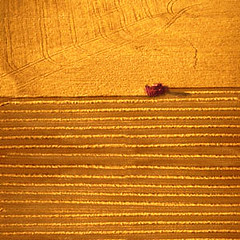Combines

The last time the Pope died I was fifteen. 1978 was the year before the Iranian Islamic revolution, a time when terrorism had less international cohesion than it does today. It was a time before the Reagan years of American optimism, during President Carter's tentative, brow-beating leadership.
The Soviet Union and its European vassal states were under the dominion of aging terror-wielding apparatchiks. By 1978 their onerous, lifeless empire was merely a dull ache for the Western world, made endurable by détente. Symbolic goodwill gestures like Apollo-Soyuz helped make communist tyranny vague and unimportant for the West, obsessed with exorcising Vietnam's demons in disco palaces that blasted the Bee Gees and Olivia Newton-John.
I remember reading issues of Soviet Life as a boy at the local branch library. Soviet Life' was a coffee table pictorial publication, proudly endorsing the softer side of the Soviet workers' paradise, pitched to Americans. I remember flipping through the colorful photo essays thinking, "Now that's a lot of wheat." But even my boyish naïveté saw through the obvious poses and setups purporting to be slices of happy Soviet life. Something about those depictions was off. Every other page showed even more wheat fields, traversed by giant mowing red combines manned by happy hay-stackers somewhere in the Ukraine. There was no mention in those pages of Stalin's purging those happy farmers' grandparents, whose mass graves were probably helping to fertilize those golden, wheat-filled plains.
Karol Wojtyla saw through the colorful lies of Soviet Life magazine. He experienced European tyranny that was not only wielded by communists, but also by Nazis and much later the softer socialist nihilists of present-day Europe. All of Europe's great 20th century social movements were like those giant red combines in Soviet Life magazine: they mowed down the human spirit, all to the same exact height.
The cardinals who elected Karol Wojtyla to the Papacy might only have considered liberating Polish Catholics at the time, or reengaging an ambivalent Europe to Catholicism. I don't know if their master plan was the elimination of international communism, per se. But ever since the Polish Pope helped his fellow countrymen ski down the slippery slope of communism, Polish light bulb jokes ring hollow. After being torn asunder by so many manipulating empires for so long, Poland really got the last laugh, didn't it?
There is much talk today about the 265th pope -- who he will be, where he will be from. African and South American candidates dominate speculative discussion. It appears that, among other things, Pope John Paul II established the papacy as a potent liberating force for the oppressed masses of the world. The next Pope is expected to build on John Paul II's liberating political legacy.
One thing I would like to know is if the next pope can save the West from itself and from radical Islam. Pope John Paul II helped to liberate the oppressed masses from under the yoke of communism. And now, the cradle of Western civilization itself needs to be convinced to step away from its suicide ledge of self-absorbed relativism and deference to expanding Islam.
Poland had Lech Walesa, who attributes his fortitude to his Catholic faith. Pope John Paul II personally helped to instill in Mr. Walesa the courage and support he needed to undo General Wojciech Jaruzelski's communist combine machine. But if the next pope has his eyes on restoring Europe's spirit, his potential allies aren't as obvious as Walesa was for John Paul II.
The few Europeans who speak out against misogynistic, anti-Semitic Islam rising in their midst are paying with their lives, like Theo Van Gogh; or are hiding from Islamic revenge in safe houses, such as Hirsi Ali, a Dutch Liberal Party member of parliament, a Somalian apostate, who speaks plainly about the plight of Muslim women. But unfortunately for the next pope, such potential allies within Europe aren't Catholic or particularly religious. They're people who are fed up with religious excess, where Islam tops the bill. So, for Europe's potential liberators -- its only real hope -- the baby gets thrown out with the bathwater. The Pope is not their ally.
Pope #265 will have to grapple with the rise of fundamentalist Islam, the hallmark of this era. It won't be enough to have group hugs with mullahs, and beg forgiveness for Crusader history. The human spirit languishes and is mowed flat in much of the Muslim world, particularly for women and non-Muslims. In some parts of the world, like the Philippines, Catholicism and Islam are vying for power. Their conflict literally translates into battle lines on maps.
We might be surprised to see the next pope be more of a warrior, not just a peacemaker. In Africa and Asia, Islam is on the move. In many cases, Christians stand in their way. Peace is something that happens when both sides agree to it. So far, peace seems very one-sided -- it's for Christians and Westerners to give, and Islam to take.
I admire John Paul II because he was a man of courage. He was a man who knew about combines mowing the human spirit -- and yes, sometimes Catholicism itself could also scythe the human spirit. But his message of hope and dignity is universal. As the modern world becomes more enmeshed in technological change, the rise of Islam, the rise of terror and further ambiguity towards the human experience, Karol Wojtyla's long papal reign will be a touchstone for maintaining human dignity. His message was not just for Catholics; appealing for human dignity and life are obvious universal causes that resonate with anyone.
I wonder what Karol Wojtyla would think of the world a hundred years hence. Will we know what it means to be human anymore? Will his ideas have relevance a century from now? What we think as universal can often be rendered ephemeral. I hope that respect for human life and dignity can withstand the combines of this unfolding century.

<< Home